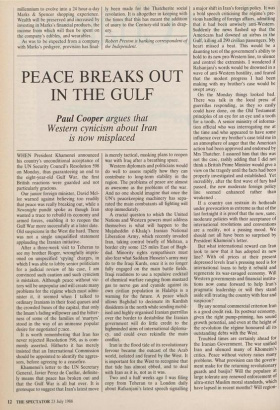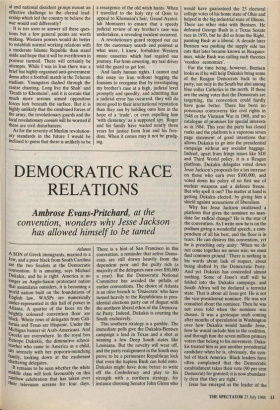PEACE BREAKS OUT IN THE GULF
Paul Cooper argues that
Western cynicism about Iran is now misplaced
WHEN President Khamenei announced his country's unconditional acceptance of the UN Security Council's Resolution 598 on Monday, thus guaranteeing an end to the eight-year-old Gulf War, the first British reactions were guarded and not particularly gracious.
Our junior foreign minister, David Mel- lor warned against believing too readily that peace was really breaking out, while a Newsnight pundit spoke as though Iran wanted a truce to rebuild its economy and armed forces, enabling it to reopen the Gulf War more successfully at a later date. Old suspicions 'in the West die hard. There was not a single unqualified statement applauding the Iranian initiative.
After a three-week visit to Teheran to see my brother Roger, wrongfully impiis- oned on unspecified 'spying' charges, in which I was able to lobby senior politicians for a judicial review of his case, I am convinced such caution and such cynicism is mistaken. Although peace without vic- tory will be unpopular and will create many problems for the regime which must admi- nister it, it seemed when I talked to ordinary Iranians in their food queues and the crowded buses of the capital, that only the Imam's fading willpower and the bitter- ness of some of the families of 'martyrs' stood in the way of an immense popular desire for negotiated pace.
It is worth remembering that Iran has never rejected Resolution 598, as is com- monly asserted. Hitherto it has merely insisted that an International Commission should be appointed to identify the aggres- sors, before agreeing to a ceasefire.
Khamenei's letter to the UN Secretary General, Javier Perez de Cuellar, definite- ly means that peace has broken out and that the Gulf War is all but over. It is grotesque to suggest that Iran's latest move is merely tactical, masking plans to reopen war with Iraq after a breathing space.
Western diplomats and politicians would do well to assess rapidly how they can contribute to long-term stability in the region. The problems of peace are almost as awesome as the problems of the war. And no one should imagine that once the UN's peacekeeping machinery has sepa- rated the main combatants all fighting will stop immediately.
A crucial queston to which the United Nations and Western powers must address themselves is what will happen to the Mujaheddin d-Khalq's Iranian National Liberation Army, which recently invaded Iran, taking control briefly of Mehran, a border city some 125 miles East of Bagh- dad. Minority rights sympathisers must also fear what Saddam Hussein's army may do to the Iraqi Kurds, once it is no longer fully engaged on the main battle fields. Iraqi readiness to use a repulsive cocktail of chemical warfare ranging from mustard gas to nerve gas and cyanide against its own civilian population in Halabja is a warning for the future. A peace which allows Baghdad to decimate its Kurdish dissidents in the north while sending mobil- ised and highly organised Iranian guerrillas over the border to destabilise the Iranian government will do little credit to the highminded aims of international diploma- cy, and could even rekindle the main conflict. Iran in the flood tide of its revolutionary fervour became the outcast of the Arab world, isolated and feared by the West. It is important for the West to recognise that that tide has almost ebbed, and to deal with Iran as it is, not as it was.
Two and a half weeks ago I was filing copy from Teheran to a London daily about Rafsanjani's latest speech signalling a major shift in Iran's foreign policy. It was a bold speech criticising the regime's pre- vious handling of foreign affairs, admitting that it had been unwisely anti-Western. Suddenly the news flashed up that the Americans had downed an airbus in the Gulf, killing all 290 civilian passengers. My heart missed a beat. This would be a daunting test of the government's ability to hold to its new pro-Western line, to silence and control the extremists. I wondered if Rafsanjani's words would be drowned in a wave of anti-Western hostility, and feared that the modest progress I had been making with my brother's case would be swept away.
On the Monday things looked bad. There was talk in the local press of guerrillas responding, as they so easily could have done, on the Old Testament principles of an eye for an eye and a tooth for a tooth. A senior ministry of informa- tion official who was interrogating me at the time and who appeared to have some influence over my brother's case told me in an atmosphere of anger that the American action had been approved and endorsed by Mrs Thatcher. I assured him that this was not the case, rashly adding that I did not think a British Prime Minister would give a view on the tragedy until the facts had been properly investigated and established. Yet incredibly, after the first wave of fury had passed, the new moderate foreign policy line seemed enhanced rather than weakened .
If a country can restrain its hotheads under provocation as extreme as that of the last fortnight it is proof that the new, sane, moderate policies with their acceptance of international resolutions and conventions are a reality, not a passing mood. We should not all have been so surprised by President Khameini's letter.
But what international reward can Iran look to now that it has adopted its new line? With oil prices at their present depressed levels Iran's pressing need is for international loans to help it rebuild and regenerate its war-ravaged economy. Will Western governments and financial institu- tions now come forward to help Iran's pragmatic leadership or will they stand aside still treating the country with fear and suspicion?
By any normal commercial criterion Iran is a good credit risk. Its postwar economy, given the right pump-priming, has sound growth potential, and even at the height of the revolution the regime honoured all its outstanding debts with the West.
Troubled times are certainly ahead for the Iranian Government. The war unified Iran and silenced many of Khomeini's critics. Peace without victory raises many problems. What provision can the govern- ment make for the returning revolutionary guards and basijis? Will the populace at large tolerate any renewed enforcement of ultra-strict Muslim moral standards, which have lapsed in recent months? Will region- al and national dissident groups mount an effective challenge to the clerical lead- ership which led the country to believe the war would end differently?
It is too soon to answer all these ques- tions but a few general points are worth making. Western powers would do better to establish normal working relations with a moderate Islamic Republic than stand aside and hope that it will be overthrown in Postwar turmoil. There will certainly be attempts. While I was in Iran there was a brief but highly organised anti-government demo after a football match in the Teheran stadium. Youngsters dashed through the centre chanting. Long live the Shah' and `Death to Khomeini', and it is certain that much more serious armed opposition forces lurk beneath the surface. But it is highly unlikely that the combined forces of the army, the revolutionary guards and the local revolutionary comite:s will be worsted if there are civil disturbances.
As for the severity of Muslim revolution- ary standards in the future I would be inclined to guess that there is unlikely to be a resurgence of the old witch hunts. When I travelled to the holy city of Qom to appeal to Khomeini's heir, Grand Ayatol- lah Montazeri to ensure that a speedy judicial review of my brother's case was undertaken, a revealing incident occurred.
A revolutionary guard stopped our car for the customary search and pointed at what were, I knew, forbidden Western music cassettes which had regaled our journey. Far from cowering, my taxi driver told the guard to get lost.
And lastly human rights. I cannot end this essay on Iran without begging the Iranians to recognise that by investigating my brother's case at a high, judicial level promptly and speedily, and admitting that a judicial error has occurred, they will do more good to their international reputation than they can by holding onto him in the hope of a 'trade', or even expelling him `with clemency' as a supposed spy. Roger and his family have waited nearly three years for justice from Iran and his free- dom. When it comes may it not be grudg- ing.















































 Previous page
Previous page